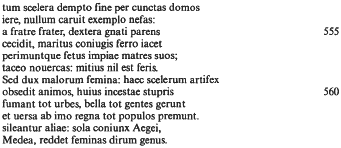No CrossRef data available.
Article contents
Is nothing gentler than wild beasts? Seneca, Phaedra 558
Published online by Cambridge University Press: 11 February 2009
Extract
Hippolytus' declamation on the progress of human depravity brings him from the invention of weapons to the climactic horror of stepmothers (553–8), after which he turns to the vices of women in general and Medea in particular (559–64):

- Type
- Shorter Notes
- Information
- Copyright
- Copyright © The Classical Association 1998
References
1 My text is quoted from Zwierlein, O., Annaei Senecae Tragoediae L. (Oxford, 1986). There are no pertinent variants, and Zwierlein lists no conjectures. All references are ad loc. except as specified.Google Scholar
2 Hutchinson, G. O., Latin Literature from Seneca to Juvenal (Oxford, 1993), p. 162 n. 27.Google Scholar
3 As always, I am grateful to both for their comments. Both argue that taceo nouercas would make an unusually effective half-line, though Dr Heyworth prefers to delete all of 558 as an interpolation. The fact that the other four half-lines in Seneca (Pha. 605, Tro. 1103, Pho. 319, and Thy. 100) are followed by a change of speaker is another hint that something may be missing here. The referee also points out that mitius nil est feris could be sound, if the next (lost) line included something (e.g. humanum genus) for it to agree with.
4 Quoted in Scriverius'; edition (Leiden, 1621): ‘haec non capio. Si dicat mitior mens est feris, melius caperem. Aliquid tale poscit sententia. Seal.’
5 The distinction is a bit artificial. Obviously, the final position of the stepmothers in the list-not to mention the praeteritio-makes them the most prominent class of criminals, while Phaedra is by far the most important member of that class in Hippolytus' eyes. Perhaps we should say then that the following words (sed dux malorum femina) refer to all human criminals, especially stepmothers, and most especially Phaedra.
6 Kritischer Kommentar zu den Tragodien Senecas (Abh. Akad. Mainz, Geistes- und Sozialwiss. Klasse, Einzelveroffentlichung 6; Stuttgart, 1986), p. 168. The interpretation of Giomini, R. (Phaedra, Rome, 1955) is similar. Both provide references to other scholars who have argued along the same lines.Google Scholar
7 Segal, C., Language and Desire in Seneca's ‘Phaedra’ (Princeton, 1986), p. 90. The interpretation, which is roughly the same as Boyle's and not entirely different from Leo's, is no doubt much older, though I have not attempted to trace it further back. Segal's Loeb2 (London and Cambridge, 1929), if we ignore—and it is not easy—the latter's irritatingly archaic style, which must have been hopelessly out of date the day it was published: ‘I say naught of stepmothers; they are no whit more merciful than beasts’.CrossRefGoogle Scholar
8 Those few scribes who preserved Achaei may be suspected of not knowing the gender of faex.Google Scholar
9 Herrmann, L. (Bude4, Paris, 1968): ‘quant aux maratres, je les passe sous silence. Les fauves ne sont rien moins que doux.’ Thomann T. (Artemis2, Zurich and Munich, 1978): ‘Ich rede nicht von Stiefmuttern: nicht Milderes gibt es als wilde Tiere.’ Chaumartin F.-R. (Bude, Paris, 1996): ‘Je passe sous silence les maratres: il n'y a pas plus de douceur ici que parmi les fauves.’ No doubt the facing-text format encourages literalism.Google Scholar




